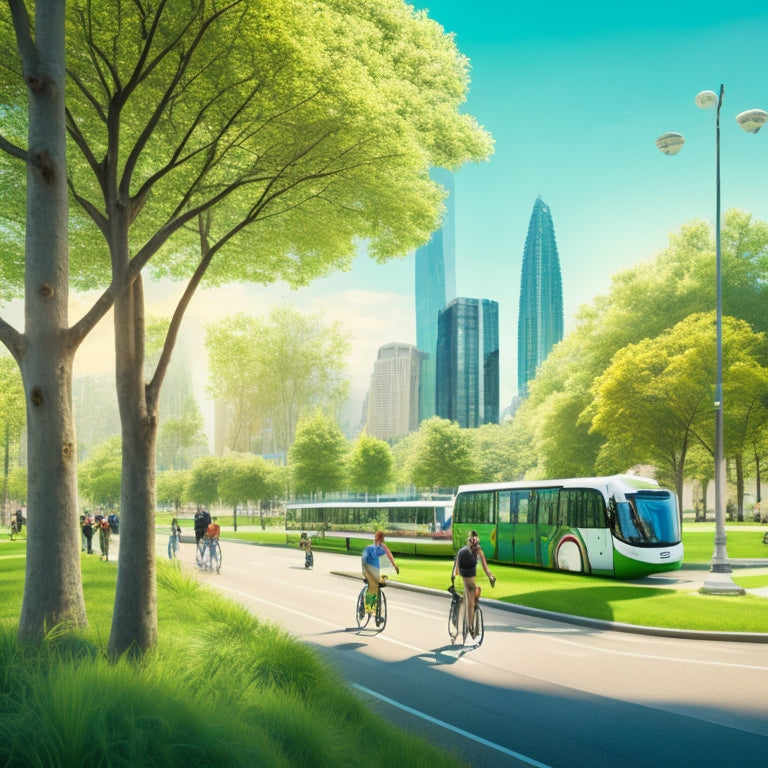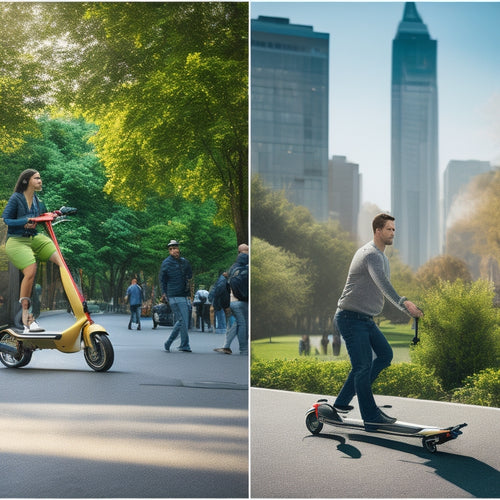
What Are Eco-Friendly Commuting Options for Busy Professionals?
Share
You have a range of eco-friendly commuting options to choose from as a busy professional. Consider electric bicycles and scooters, which offer a sustainable alternative to traditional commuting. Public transit systems are also going green, with eco-friendly vehicles and practices reducing emissions and noise pollution. Carpooling and hybrid vehicles are other options that can decrease your carbon footprint and commute expenses. Even electric motorcycles and green ride-sharing alternatives are available. By exploring these options, you can greatly reduce your environmental impact and find a commute that works best for you - and discover even more benefits as you explore further.
Key Takeaways
• Electric bicycles and scooters offer a sustainable commuting alternative, prioritizing safety with helmets and traffic rules.
• Public transit systems incorporate eco-friendly vehicles and practices, reducing emissions, noise, and congestion.
• Carpooling and ride-sharing apps reduce carbon footprint, commute expenses, and stress levels, offering perks like preferred parking spots.
• Hybrid vehicles provide fuel-efficient rides, reducing carbon footprint, fuel costs, and maintenance needs, with potential tax incentives.
• Cycling reduces air pollutants, promotes health benefits, and earns carbon credits, setting a positive example for others.
Electric Bicycles for Commuters
As a busy professional, you can greatly reduce your carbon footprint and navigate congested city streets with ease by considering electric bicycles as a viable commuting option. Not only do e-bikes offer a sustainable alternative to traditional transportation methods, but they also provide a convenient and cost-effective way to get to work.
When it comes to bicycle safety, it's important to prioritize visibility and awareness. Wear bright or reflective clothing, and make sure your bike is equipped with lights and reflectors to increase visibility, especially during early morning or evening commutes.
Urban infrastructure also plays a significant role in ensuring a safe and enjoyable ride. Look for cities with dedicated bike lanes, bike-share programs, and secure bike parking facilities. By choosing an e-bike, you'll not only reduce your carbon footprint but also enjoy a healthier, more environmentally friendly commute.
With the right safety precautions and urban infrastructure in place, you'll be well on your way to a more sustainable and enjoyable daily commute.
Sustainable Public Transit Options
With public transit systems increasingly incorporating eco-friendly vehicles and practices, you can now opt for sustainable public transit options that reduce your carbon footprint and daily commute costs. As a busy professional, you can enjoy the convenience of public transportation while doing your part for the environment.
Many cities are introducing smart buses that run on alternative fuels, reducing emissions and noise pollution. Additionally, green corridors are being created, dedicating lanes exclusively for public transportation, reducing congestion and travel time.
Here's a comparison of traditional vs. sustainable public transit options:
| Feature | Traditional | Sustainable |
|---|---|---|
| Fuel | Diesel | Alternative fuels (e.g., electric, hybrid) |
| Emissions | High | Low |
| Noise | High | Low |
| Congestion | High | Low |
| Cost | High | Low |
Carpooling for Busy Professionals
As a busy professional, you're likely no stranger to the daily commute struggle. Carpooling can be a game-changer, and with the rise of ride-sharing apps, it's easier than ever to find a carpool buddy.
Ride-Sharing Apps Benefits
You can greatly reduce your carbon footprint and daily commute expenses by using ride-sharing apps that facilitate carpooling with fellow professionals traveling similar routes. These apps offer a convenient and eco-friendly way to commute, while also providing an opportunity to network and build connections with like-minded individuals.
One of the key benefits of ride-sharing apps is the ability to select drivers based on user ratings, ensuring a safe and reliable commute. Additionally, driver incentives, such as rewards for high ratings and on-time arrivals, promote a culture of excellence among drivers.
Here's a breakdown of the benefits of ride-sharing apps:
| Benefit | Description | Advantage |
|---|---|---|
| Reduced Carbon Footprint | Lower emissions from shared rides | Environmentally friendly |
| Cost Savings | Split fuel costs with fellow commuters | Increased affordability |
| Increased Productivity | Use commute time for work or relaxation | Improved work-life balance |
| Networking Opportunities | Connect with professionals from various industries | Expanded professional network |
| Convenience | Real-time ride tracking and scheduling | Stress-free commuting |
Reducing Traffic Congestion
By carpooling with fellow professionals, you'll not only reduce your own stress levels but also contribute to a larger goal: alleviating traffic congestion in your city. As you share your daily commute with others, you'll be part of a solution that tackles the root causes of traffic jams. By reducing the number of cars on the road, you'll help alter traffic patterns, making your city's roads more efficient. This, in turn, can lead to reduced travel times, lower emissions, and a more pleasant commute experience.
Carpooling also has the potential to influence road pricing policies. As more people carpool, there's a reduced need for tolls and congestion charges, which can be a significant expense for solo drivers. By carpooling, you'll be part of a movement that promotes a more sustainable transportation system, one that prioritizes shared mobility over individual car ownership.
Cost-Effective Commuting
How much would you save annually if you could slash your fuel costs, tolls, and parking fees in half? Carpooling can be a game-changer for busy professionals like you. By sharing the commute with colleagues or friends, you can greatly reduce your transportation expenses. Imagine having more money in your pocket for things that matter.
One way to make carpooling even more cost-effective is to use fuel cards. These cards can help you track and manage your fuel expenses, making it easier to split the costs with your carpool buddies. Plus, if your company offers reimbursements for fuel costs, you can take advantage of that too.
Some companies even offer special perks for carpoolers, such as preferred parking spots or reduced parking fees.
Electric Scooters in Cities
Riding electric scooters in cities has become increasingly popular among busy professionals, offering a convenient and environmentally friendly alternative to traditional commuting methods. As you consider hopping on an e-scooter, you'll want to prioritize scooter safety. Always wear a helmet, follow traffic rules, and be mindful of pedestrians and other vehicles.
You'll also want to make sure you're riding in scooter-friendly zones, as some cities have designated lanes or areas for e-scooters.
Urban infrastructure plays a significant role in supporting e-scooter commuting. Cities with well-designed bike lanes, pedestrian paths, and dedicated scooter zones make for a safer and more enjoyable ride. You'll appreciate cities that have invested in infrastructure, like designated parking areas and charging stations, making it easy to dock and recharge your scooter.
Hybrid Vehicle Commuting Benefits
As you weigh your eco-friendly commuting options, consider the benefits of hybrid vehicles, which offer a smooth, fuel-efficient ride while reducing your carbon footprint.
You'll appreciate the savings on fuel costs, thanks to hybrid vehicles' exceptional fuel efficiency. With a hybrid, you'll get more miles per gallon, which translates to fewer trips to the pump and lower fuel expenses.
Plus, hybrid vehicles require less frequent vehicle maintenance, reducing the time and money spent on repairs and upkeep. This means you'll have more time to focus on your busy professional life.
Additionally, many hybrid vehicles qualify for tax incentives and rebates, further offsetting the cost of ownership. By choosing a hybrid, you'll not only reduce your environmental impact but also enjoy a more economical and convenient commute.
With the latest advancements in hybrid technology, you can enjoy a comfortable, feature-rich ride while doing your part for the planet.
Environmental Impact of Cycling
As you consider cycling as a commuting option, you'll be making a significant impact on the environment. By choosing to cycle, you're reducing air pollution and minimizing your carbon footprint, which is a significant step towards a more sustainable future.
Additionally, you'll be reaping the health benefits that come with regular cycling, making it a win-win for both you and the planet.
Air Pollution Reduction
You can greatly reduce your carbon footprint and contribute to a cleaner environment by cycling to work, as a single commuter switching to cycling can save up to 150 kg of CO2 emissions per year. By choosing to cycle, you'll not only reduce air pollution but also decrease your reliance on fossil fuels, promoting the adoption of cleaner fuels. This, in turn, encourages urban planning that prioritizes sustainable transportation and eco-friendly infrastructure.
Here are some key benefits of cycling on air pollution reduction:
-
Reduces particulate matter (PM) and nitrogen oxides (NOx) emissions, common air pollutants
-
Decreases ozone formation, a major component of smog
-
Helps reduce respiratory problems and other health issues linked to air pollution
-
Lowers the formation of ground-level ozone, a potent greenhouse gas
-
Supports the development of green spaces and parks, which absorb air pollutants and produce oxygen
Carbon Footprint Minimized
By opting for cycling, you're not only reducing air pollution but also minimizing your carbon footprint, with a single cyclist producing a mere 21 grams of CO2 emissions per kilometer, compared to 120 grams per kilometer for a car.
This significant reduction in emissions can have a substantial impact on the environment, especially when combined with other eco-friendly practices. For instance, many eco offices now offer carbon credits to employees who choose to cycle to work, incentivizing a sustainable commute.
By making the switch to cycling, you'll not only be doing your part for the environment, but you may also be rewarded with perks like free parking or on-site bike storage. As you pedal your way to work, you can feel good knowing you're reducing your carbon footprint and setting a positive example for others.
Health Benefits Abound
Cycling to work can boost your mood and energy levels, thanks to the release of endorphins, also known as 'feel-good' hormones, which are triggered by physical activity. This natural high can set a positive tone for your day, making you more productive and focused.
As you pedal, you'll also experience a sense of accomplishment and confidence, which can translate to other areas of your life.
Regular cycling can have a profound impact on your overall health and wellbeing.
Some of the key benefits include:
-
Improved Mental Wellbeing: Cycling reduces stress and anxiety by releasing tension and promoting relaxation.
-
Increased Physical Activity: Regular cycling can help you meet the recommended daily exercise goals, reducing the risk of chronic diseases.
-
Enhanced Cardiovascular Health: Cycling strengthens your heart and lungs, improving overall cardiovascular health.
-
Weight Management: Cycling can help you maintain a healthy weight, reducing the risk of obesity-related health issues.
-
Better Sleep: The physical activity and fresh air can help regulate your sleep patterns, leading to more restful nights and energized mornings.
Electric Motorcycles for Daily Use
Electric motorcycles are quietly revolutionizing daily commutes, offering busy professionals a sleek, eco-friendly alternative to traditional gas-guzzlers. You're probably wondering, 'But are they practical for daily use?' The answer is a resounding yes! With advancements in technology, electric motorcycles now boast impressive battery ranges, some up to 200 miles on a single charge. That's more than enough to get you to and from work, and then some. Plus, many models come equipped with fast-charging capabilities, so you can top up during your lunch break.
When it comes to motorcycle safety, electric bikes are on par with their gas-powered counterparts. They're designed with safety features like ABS brakes and traction control, giving you peace of mind on the road. And let's not forget the environmental benefits – zero emissions means you can ride guilt-free.
With their sleek designs, impressive performance, and eco-friendly credentials, electric motorcycles are an attractive option for busy professionals looking to ditch the traffic and reduce their carbon footprint.
Green Ride-Sharing Alternatives
You're not limited to solo commuting, as green ride-sharing alternatives are now widely available, offering a convenient and eco-friendly way to get to work with like-minded individuals. These services are designed to reduce carbon emissions and make your daily commute more sustainable. By sharing rides with colleagues or others traveling in the same direction, you can greatly decrease your carbon footprint.
Some popular green ride-sharing alternatives include:
-
Carpooling platforms that connect you with coworkers or neighbors traveling to similar destinations
-
Corporate Partnerships that offer discounted rates for employees who carpool or use eco-friendly transportation methods
-
Insurance Options that provide discounted rates for drivers who participate in ride-sharing programs
-
Vanpool services that provide a convenient and affordable way to commute to work
-
Online platforms that help you find and connect with ride-sharing partners in your area
Frequently Asked Questions
Can I Afford Eco-Friendly Commuting Options on a Tight Budget?
You can afford eco-friendly commuting options on a tight budget by exploring cost-cutting measures like budget biking, which can save you money on transportation costs while reducing your carbon footprint.
How Do I Stay Safe While Commuting in Heavy Traffic or Bad Weather?
As you hit the road, coincidentally, the rain starts pouring down - a perfect storm! Stay safe by practicing defensive driving, being mindful of weather conditions, and staying alert to guarantee a smooth, stress-free commute.
Are Electric Bicycles Suitable for Long-Distance or Hilly Commutes?
You're wondering if electric bicycles are suitable for long-distance or hilly commutes. They can be, depending on the battery life, which typically ranges from 20 to 60 miles on a single charge, making them ideal for shorter mountain routes.
Can I Use Public Transit if I Live in a Rural or Suburban Area?
As you navigate the rural landscape, think of public transit as a thread weaving together the fabric of your community. You can tap into rural routes and feeder services, connecting you to urban hubs, making commuting a breeze.
Do Eco-Friendly Commuting Options Require Special Licenses or Training?
You won't need special licenses or training for most eco-friendly commuting options, but some electric or hybrid vehicles may require certification for charging or maintenance, and regular vehicle inspections are a must for safety.
Related Posts
-

5 Essential Car Battery Maintenance Tips
You can extend your car battery's lifespan and prevent unexpected breakdowns by following five essential maintenance ...
-

Why Opt for These Affordable E-Scooter Alternatives?
You're tired of overspending on transportation and harming the environment, which is why you're considering affordabl...
-

Why Choose Green Automotive Accessories for Your Ride?
By switching to eco-friendly automotive accessories, you can reduce your carbon footprint, save up to 20% on fuel cos...


